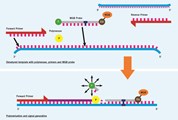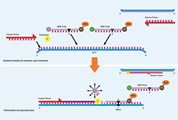Short probes that incorporate a minor groove binder (MGB); to be used in 5’ nuclease (TaqMan - MGB) technology for human IVD applications.
MGB Eclipse® probes are manufactured, which allows you to:
- Transition from research to clinical diagnostics while maintaining robust assay performance
- Begin your testing sooner with faster, more reliable delivery
We have combined our proven oligo manufacturing expertise and ISO 9001:2015, GLP & GMP certified production processes to deliver MGB Eclipse Probes. These probe are ideal for genotyping qPCR assays. Our range of fluorophore options (FAM, HEX, CY5, and Yakima Yellow® (EliTech Group) allows you to ensure compatibility with your instrument and more easily design multiplex assays.
Eurofins Genomics MGB Probes incorporate a 5’ fluorescent dye and the 3’ Eclipse quencher (EQ) attached to the minor groove binder (MGB) molecule.
Select your required dye-quencher combination:
| 5' Reporter |
Abs [nm] |
Em [nm] |
3' Quencher |
| FAM [FAM] |
495 |
520 |
MGB-Eclipse [MGBEQ] |
| Yakima Yellow [YAKYE] |
530 |
549 |
MGB-Eclipse [MGBEQ] |
| HEX [HEX] |
535 |
556 |
MGB-Eclipse [MGBEQ] |
| CY5-MGB (GE) |
649 |
670 |
MGB-Eclipse [MGBEQ] |
Product specifications:
- Delivered quantity: 5, 20 and 40 nmol
- Probe lengths: 13 - 30 bases
- HPLC purified by default
- TAT: 2 weeks
- 100% Mass verification by MALDI-TOF
- Delivery format: lyophilized
12MG
Advantage of the MGB molecule in real-time PCR
Probes containing a MGB molecule form an extremely stable duplex which gives the probe a significant increase of the melting temperature (Tm). It is therefore possible to use shorter probes (down to 13 bases) in real-time PCR compared to conventional dual labelled probes.
MGB Probes for gene expression analysis & SNP genotyping
The double-stranded DNA is denatured by raising the temperature. At this point the fluorescent dye of the probe is quenched by the MGB-Eclipse quencher.

By decreasing the temperature the PCR primers and MGB probe anneal to their specific target sequence. Allelic discrimination is achieved by the selective annealing of the MGB probes (Figure 2).
The taq polymerase synthesises a complementary DNA strand using the PCR primers and template as a guide. When the polymerase reaches the MGB probe its 5´nuclease activity cleaves the probe and separates the fluorescent dye from the non-fluorescent quencher.
